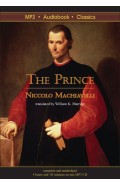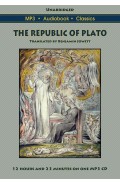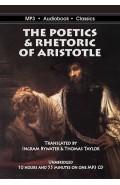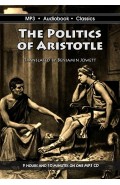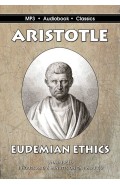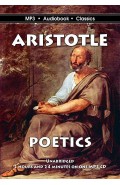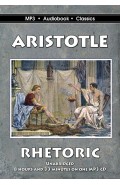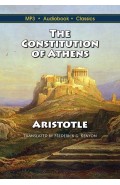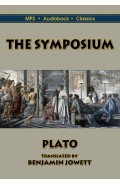| Track | Section | Length |
| 01 | 01 Eudemian Ethics - Book I Chapters 1-8 | 29:34 |
| 02 | 02 Eudemian Ethics - Book II Chapters 1-6 | 31:23 |
| 03 | 03 Eudemian Ethics - Book II Chapters 7-11 | 35:52 |
| 04 | 04 Eudemian Ethics - Book III Chapters 1-7 | 42:08 |
| 05 | 05 Eudemian Ethics - Book VII Chapters 1-5 | 38:22 |
| 06 | 06 Eudemian Ethics - Book VII Chapters 6-11 | 31:42 |
| 07 | 07 Eudemian Ethics - Book VII Chapters 12-15 | 37:14 |
| 08 | 08 Nicomachean Ethics - Book I | 59:09 |
| 09 | 09 Nicomachean Ethics - Book II | 40:42 |
| 10 | 10 Nicomachean Ethics - Book III | 1:06:23 |
| 11 | 11 Nicomachean Ethics - Book IV | 1:01:15 |
| 12 | 12 Nicomachean Ethics - Book V | 1:03:50 |
| 13 | 13 Nicomachean Ethics - Book VI | 43:37 |
| 14 | 14 Nicomachean Ethics - Book VII | 1:13:40 |
| 15 | 15 Nicomachean Ethics - Book VIII | 1:05:38 |
| 16 | 16 Nicomachean Ethics - Book IX | 59:20 |
| 17 | 17 Nicomachean Ethics - Book X | 1:03:13 |
Notes
Eudemian Ethics
Read by: Geoffrey Edwards
Book Coordinator: Geoffrey Edwards
Meta Coordinator: TriciaG
Proof Listener: bala
Nicomachean Ethics
Read by: Geoffrey Edwards
Book Coordinator: Geoffrey Edwards
Meta Coordinator: TriciaG
Proof Listener: Hari
Artwork
Cover: Aristotle by Paolo Veronese (1528-1588) Biblioteca Nazionale Marciana
Inset: Engraving of Aristotle by Ambroise Tardieu (1788-1841)
Insert: Aristotle, holding his Ethics, detail from the Vatican frescoe The School of Athens, Raphael, (1483-1520)
Recordings
These recordings were made using the author’s original published work, which is in the public domain. The readings were recorded by members and volunteers of Librivox.org, which has generously made the recordings available to the public domain. The audio files have been lightly edited and have been engineered using professional audio tools for maximum sonic quality. While Librivox condones the sale and distribution of these recordings, it is not associated with the management or operations of MP3 Audiobook Classics.
Aristotle coined the term “ethics” to define a field of study first undertaken by Socrates and Plato that seeks a rational answer to the question of how human beings should best live. He considered ethics as a practical study, along with politics and poetics and rhetoric. At the core is the notion of moral virtue, an excellence of character that develops in part due to upbringing and in part as a result of habits of action. He outlines four cardinal virtues of prudence, temperance, courage and justice, which combine in the continuing effort to achieve the highest human good. Reason is a critical component of virtue, as it is what sets humans apart. In his words, “The function of man is activity of soul in accordance with reason”.
Eudemian Ethics is the shorter and lesser known of Aristotle’s treatises on ethics. The title is derived from his pupil Eudemus of Rhodes, who may have helped edit the work, and its companion Greek word eudaimonia is often translated as well-being and happiness. It consists of eight books, three of which (IV-VI) are identical to books V-VII in the Nicomachean Ethics. Nicomachean Ethics is the best known and most mature of his ethical writings and was probably edited by his son and pupil Nicomachus, from which the name derives. It consists of ten books which were originally separate scrolls based on notes from his lectures at the Lyceum. It became a core work throughout history and was instrumental in the formation of European law and both Christian and Muslim theology.
Play sample:
Download a PDF datasheet
| Item Info | |
| EAN - DVD case | 0683422134760 |
| EAN - CD jacket | 0674012595061 |
| Media | MP3 CD |
| Package | DVD case, CD jacket, CD security sleeve, download zip file |
| Author | Aristotle (384 BC - 322 BC). |
| Translator | Eudemian Ethics translated by J. Solomon. Nicomachean Ethics translated by Thomas Taylor. |
| Recording | |
| Read by | Geoffrey Edwards |
| Length | 14 hours 2 minutes Eudemian Ethics 4 hours 6 minutes Nicomachean Ethics 9 hours 56 minutes |
| Type of Reading | Solo |
The Ethics of Aristotle
- Author: Aristotle
- Product Code: DB-1161
- Availability: In Stock
-
$11.99
Available Options
Related Products
The Prince
Niccolo Machiavelli broke the mold when he wrote The Prince, an ostensibly traditional work in the s..
$9.99
The Republic of Plato
The Republic of Plato is the greatest and best known of Plato’s works and possibly the most influent..
$11.99
The Poetics and Rhetoric of Aristotle
Poetics and Rhetoric together with Ethics and Politics constitute the pillars of Aristotle’s Practic..
$11.99
The Politics of Aristotle
Aristotle’s Ethics describes the means to the happy life of virtue intended by nature. In Politics h..
$11.99
Eudemian Ethics
Aristotle coined the term “ethics” to define a field of study first undertaken by Socrates and Plato..
$9.99
Poetics
Poetics is the earliest known work that develops a theory of drama and related literary forms. His ..
$7.99
Rhetoric
Rhetoric is an ancient Greek treatise on the art of persuasion still considered “the most important ..
$9.99
The Constitution of Athens
The Constitution of Athens is a document attributed to Aristotle that describes the political system..
$9.99
The Symposium
The Symposium is one of Plato’s best-known works, written in 385 BCE or later, and appreciated for b..
$9.99








